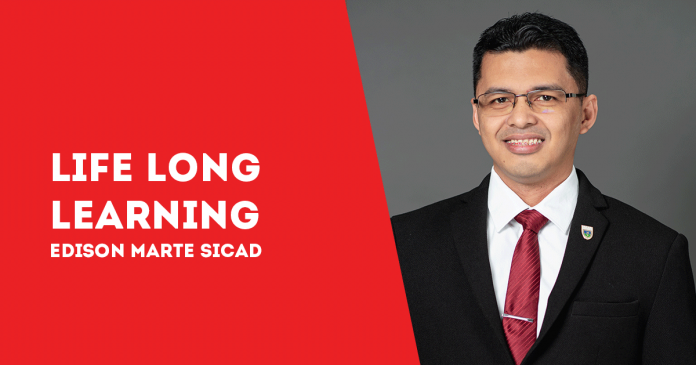
BY EDISON MARTE SICAD
FOR THE OPENING of classes this school year, I will no longer be in a classroom welcoming the students. Also, I will no longer have that immediate opportunity of giving a good chat nor have that spontaneous sharing of a personal success story rooted on so many failures and setbacks to make students realize that they can change for the better.
Students are naturally ambitious. Youthfulness can trigger a “seize the day” mentality (YOLO, as they say): brimming with pride and possibility; and also having that penchant for rebelling or breaking the rules. Thrill-seekers.
In the same manner, dreams—lives even—are wasted in the young. Instead of excitement for having options to choose from, they end up being confused by indecision and lack of self-confidence. Instead of banking on the idea that they have enough time to learn from their mistakes, they get scared of committing mistakes; not because of wanting to be excellent, but because of avoiding being hurt.
And so, allow me to give this message to you (including myself honestly) my dear student who, from time to time, may be plagued by negative thoughts, doubts, and the lingering pain of pessimism. May this message be a dose of help in your journey towards, as Abraham Maslow would have it, self-actualization and eventually, into transcendence.
***
It begins with a question: How bad do you really want it?
With this alone, I hope your negative thoughts, self-limiting beliefs, and lack of inspiration will be replaced with the vision of your dreams. Again, how bad do you really want it? Because if you really want it that bad, nothing and no one can stop you.
We can, also by analogy, use Pascal’s Wager: you are aiming for something that may fail (which is a normal human occurrence). But then it would be better to act on it and then know you have failed than not act on it at all, which could become a lifelong regret. As you age, your conscience will bother you with What If.
But deep inside, you know, that if only you have tried and have given your all, who knows… but if you will never risk it, then you will never know.
Are you willing to pay the price? For there is nothing in between. There is no life in a vacuum. Either you are able to live to the fullest of your potential or not. There is no such thing as “comfortable success.”
For why aim and preoccupy yourself with a goal that you don’t believe you can achieve? If you have booked a flight, surely you are already visualizing—by causal connection almost unconsciously—that you will arrive at your destination.
What do I mean by this?
Imagine that you are an awareness living inside with the Ideal Self. (This requires some sort of detachment and at the same time a heightened self-esteem to the point of being selfish.)
You are now that Ideal person: the towering figure, the champion, or the best in your profession. But the awareness is still that of an apprentice; you as the apprentice who will eventually become the master.
Let’s be more simplistic: the ten push-ups that you can do right now is but an initial step in your aim of performing a hundred push-ups someday. You may not be able to do the hundred push-ups immediately, but eventually the ten push-ups you are starting today can lead to a hundred push-ups if you are that serious with your training. This may sound preachy. But the logic of success is clearly presented in this example: One step at a time. Others call it the First Principles.
And here comes the first anti-self talk: if it is that simple a process, why do many people fail to do what they know will help them achieve what they want?
The simple answer is: because they didn’t do it at all; they didn’t give their all. Their doubts led to hesitance and eventually into mediocrity. When you don’t believe that you can do it, then you will never have the energy required to do it. As they say, the battle is half won or lost in the mind.
But then using others as examples can sometimes be a fallacious assertion: for those who have succeeded may have been in a better environment. Better compared to whom? Yourself? We all know that this argument can also go the other way: there were those who had it worse than you but were able to make it. Now what?/PN



